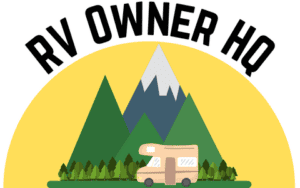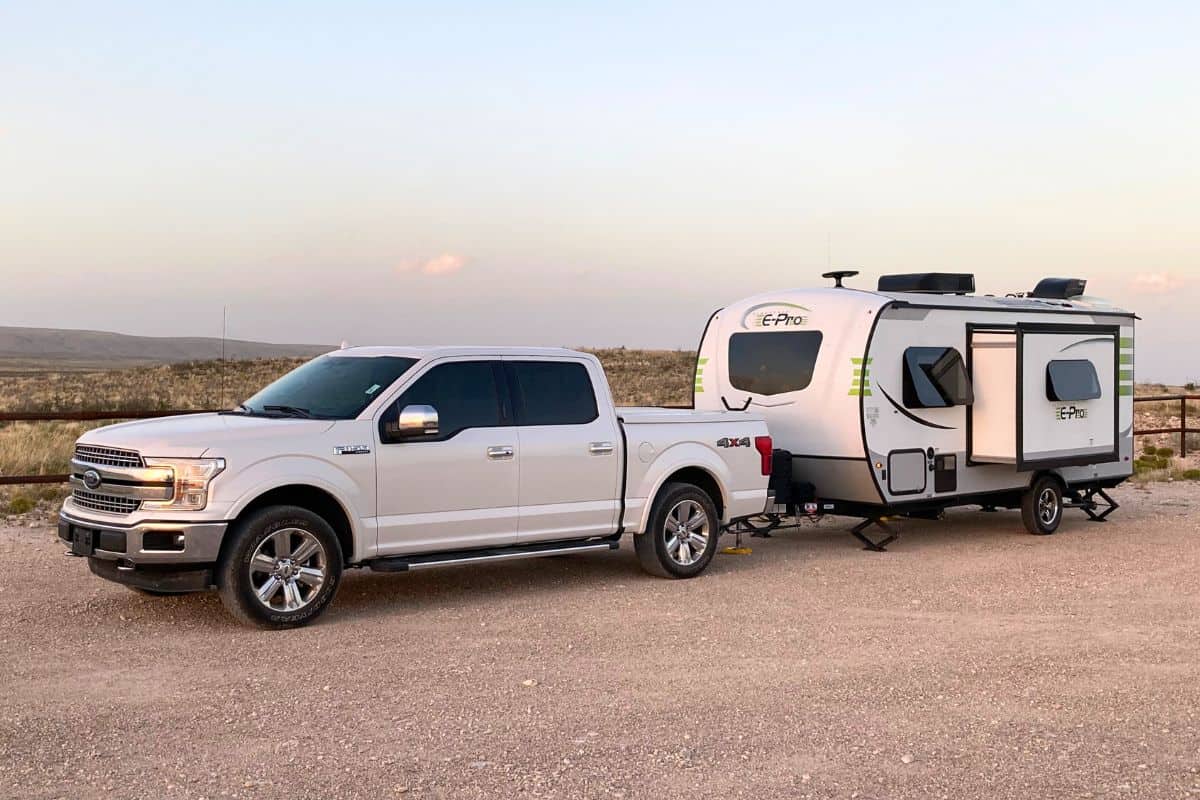Are you ready to hit the open road in your RV?
Before you set off on your adventures, it’s crucial to have the right RV travel tips and RV accessories up your sleeve.
As a seasoned RVer, I’ve learned that preparation is key to ensuring a smooth and enjoyable trip.
In this comprehensive RV travel guide, we’ll dive into 36 must-know RV travel tips and hacks, covering everything from pre-trip planning to campground etiquette to making the most of your adventures with kids in tow.
Whether you’re an RV beginner or a seasoned veteran, these travel tips will help you make the most of your time on the road.
Pre-Trip RV Travel Tips
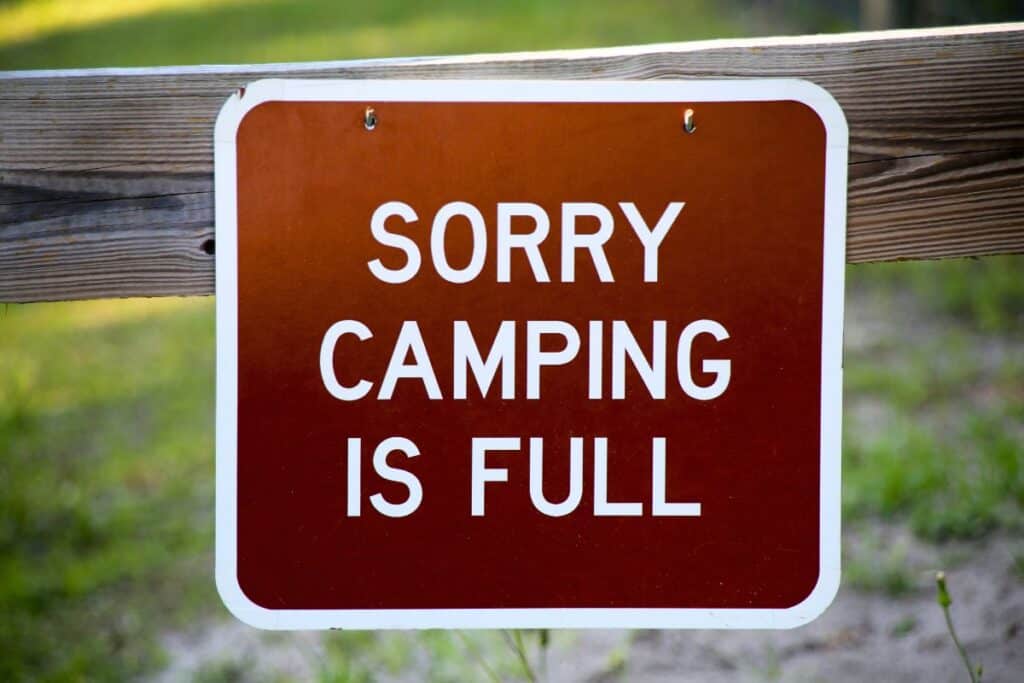
Before hitting the road, taking time to plan ahead is essential for a smooth and enjoyable journey.
From researching your destination to creating a comprehensive checklist and mapping out your route, these pre-trip RV travel tips will help you stay organized and prepared for anything that comes your way.
1. Research Your Destination: Scout it Out Before You Go
Before setting out on any RV adventure, it’s important to spend some time researching and planning your trip.
Things to research and check include campground amenities, reviews, and availability to ensure that your chosen location meets your needs.
Consider the weather and seasons when planning your trip, as some destinations may be more enjoyable during specific times of the year. (Also don’t just assume that everything is open year-round, as many destinations including up north or in the mountains close down for the winter season, which can extend into late fall and early spring.)
Also, don’t forget to look for nearby attractions and activities that align with your interests, such as hiking trails, fishing spots, or cultural landmarks.
2. Create & Use a Checklist: Tick-Tock, It’s Checklist O’Clock
Creating and using a comprehensive checklist is a must if you don’t forget anything.
List all the necessary food, medications, clothing, bedding, kitchenware, and toiletries you’ll need for your trip.
Remember to include RV-specific items like hoses, leveling blocks, and a tire pressure gauge.
Some RVers like to have different lists for each packing category, personally though, I find it easier to just have one master list to work from, so I have everything I need for the trip in one place.
Also, don’t forget to check that you have all your important travel documents, such as your ID, vehicle registration, insurance papers, and passport, if you plan on crossing a border before departing.
3. Plan Your Route: Map Your Adventure
Another important RV travel tip is to plan your route ahead of time, as this will help ensure a stress-free RV journey.
Utilize RV-specific GPS like this popular one on Amazon or route-planning apps to find the most suitable roads for your vehicle.
Take into account road conditions, tolls, and low clearances that may affect your travel.
Factor in fuel stops and rest areas along the way to ensure a comfortable and safe trip.
4. Make Reservations in Advance: Don’t Get Left Out in the Cold
RV travel and camping are more popular than ever, which makes reserving you’re campsite as early as possible more important than ever.
Popular campgrounds fill up quickly, as it’s not uncommon for national and even state parks to fill up months in advance, especially around major holidays, think Fourth of July, Labor Day, and Memorial Day.
So make sure to book your camping spots as early as possible to not only secure a site but also to snag one of the better campsites, personally, I always look for waterfront options.
Before making that reservation though, make sure you’re aware of the campground’s cancellation policies in case your plans change unexpectedly.
5. Check Weather Forecasts: Weather or Not
Before embarking on your RV trip, check the weather forecasts for your planned route and destination.
Being aware of potential adverse conditions like storms, extreme heat, or cold will help you prepare accordingly.
Pack appropriate clothing, gear, and emergency supplies based on the expected weather.
If severe weather is predicted, consider adjusting your travel plans to ensure the comfort and safety of you and your passengers.
RV Travel Tips (Maintenance & Safety)
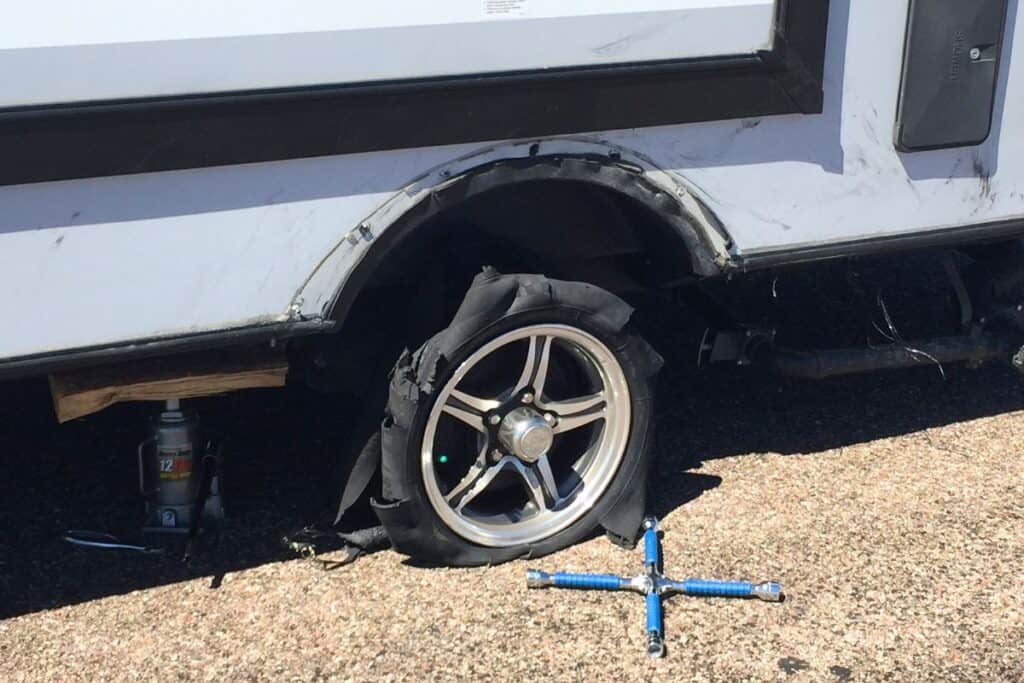
Making sure your RV is in tip-top shape and prioritizing safety are crucial aspects of any successful RV road trip.
In this section, we’ll cover essential maintenance and safety RV travel tips that every RVer should know.
6. Perform Regular Maintenance Checks: Fix It Before It Fails
Performing regular maintenance checks is a must to keep your RV in good working condition and prevent unexpected breakdowns.
Before each trip, take the time to check your fluids and batteries to ensure they are at the proper levels.
Inspect belts, hoses, and filters regularly for signs of wear or damage, and replace them as needed.
It’s also important to perform regular inspections of the RV roof and slide-outs, paying close attention to seals and caulk to ensure the camper is watertight, as it’s always easier to fix a compromised seal or caulk with home court advantage.
I’ve found keeping all these RV maintenance tasks and inspections in my head challenging, because of this, I keep an RV maintenance log and schedule to help me stay on top of it all.
7. Check Tire Pressure & Tread: Tread Wisely
Maintaining proper tire pressure and tread depth is critical for the safety and performance of your RV.
Regularly check your tire pressure using a reliable tire gauge like this popular one on Amazon that doesn’t require batteries, and inflate tires to the manufacturer’s recommended level.
Inspect your tires for signs of uneven wear, damage, or objects lodged in the tread.
Replace tires when the tread depth reaches the minimum safe level, the U.S. Department of Transportation recommends replacing tires when they reach 2/32″. A common way to check this is to place a penny facing down inside the tire’s tread, if you can see the top of Lincon’s head, it’s probably time to replace your tires.
8. Know Your RV’s Dimensions & Weights: Size It Up
Knowing your RV’s dimensions and weights is critical for safe and legal travel.
RV Lengths & Weights You Should Know:
- Overall RV Length (With and Without the Tow Vehicle)
- RV Width
- RV Height
- Fully Loaded Weight
- Cargo Carrying Capacity
- Gross Vehicle Weight Rating
It’s important to be aware of height, length, and width restrictions on the routes you plan to take, as some roads, bridges, and tunnels may have limitations that could impact your RV.
It’s also important to ensure that your RV is not overloaded, as this can cause safety issues and put undue stress on your vehicle’s components.
Make sure to distribute weight evenly throughout your RV for better handling and stability on the road.
9. Practice Safe Driving: Drive Smart
Driving or towing an RV, while manageable for most drivers with a little practice, requires a different skillset, careful attention to detail, and extra caution, due to the longer length and extra weight.
So before heading out, it’s important to familiarize yourself with your RV’s size, weight, and handling characteristics.
Take the time to practice driving or towing your RV in a safe, open area to gain confidence and develop a feel for its unique dynamics.
Adjust your driving speed to accommodate your RV’s size and the road conditions, as larger vehicles require more time to accelerate, brake, and turn.
Allow extra space for turning and stopping, and be mindful of your RV’s tail swing when maneuvering in tight spaces.
Use extra caution in high winds and mountainous terrain, as these conditions can affect your RV’s stability and handling substantially.
It’s also really important to maintain a safe following distance and be mindful of your RV’s height when navigating underpasses or low-hanging branches.
10. Install & Properly Maintain Safety Devices: Staying Safe on the Road
Installing and maintaining safety devices in your RV can provide peace of mind and protect you and your family.
Equip your RV with smoke detectors, carbon monoxide detectors, and fire extinguishers, and check them regularly to ensure they’re in good working order.
Also make sure the camper has proper ventilation to prevent gas leaks and buildup, which can be dangerous in confined spaces.
Plus, it’s also a good idea to add a backup camera and tire pressure monitoring system for added safety and convenience, if you’re RV didn’t come with those features standard, which most don’t.
- See the best affordable RV backup camera system I’ve found, which is the AMTIFO Wireless Backup Camera.
- See the best affordable tire monitoring system I’ve found, which is the Tymate RV Tire Pressure Monitoring System
11. Have an RV Tool Kit: Ready, Set, Repair
Having a well-stocked RV tool kit on hand can be a lifesaver in case of unexpected repairs or maintenance needs.
Include essentials like a jack, lug wrench, pliers, screwdrivers, wrenches, and a multimeter.
Don’t forget to pack spare fuses, light bulbs, and batteries, as well as duct tape, zip ties, and a can of WD-40 for quick fixes.
Having these tools readily available can help you tackle minor issues and avoid costly roadside assistance calls.
12. RV Appliance Check: Keep It Cooking
Before setting out on your trip, conduct a thorough check of all your RV’s appliances to ensure they are functioning properly.
Test your refrigerator, stove, oven, microwave, and air conditioning unit, and address any issues or malfunctions before hitting the road.
Also, make sure your water heater, pump, and tanks are in good working order, and familiarize yourself with the operation of your RV’s generator, if your camper has one.
13. Have Emergency Plans: Better Safe than Sorry
Having emergency plans in place before an emergency can help you navigate unexpected situations with confidence and minimize potential risks or danger.
Create a communication plan that includes emergency contact information for family members, friends, and roadside assistance services.
Develop an evacuation plan that outlines escape routes and designated meeting points in case of fire, severe weather, or other emergencies.
Familiarize yourself with basic first aid procedures and pack a well-stocked first aid kit tailored to your family’s needs.
14. Invest in an Emergency Beacon: Safety Signal
Investing in an emergency beacon can provide an added layer of safety and peace of mind, especially when traveling in remote areas or off-grid locations with no cell service.
Emergency beacons, such as personal locator beacons (PLBs) or satellite messengers, allow you to send distress signals and communicate your location to emergency responders in case of an emergency situation.
If you do choose to invest in an emergency beacon be aware that most require a monthly subscription plan for service.
It’s also important to make sure to familiarize yourself with the device’s operation and regularly test and maintain it to ensure it’s ready when you need it most.
Campground Etiquette & Setup RV Travel Tips
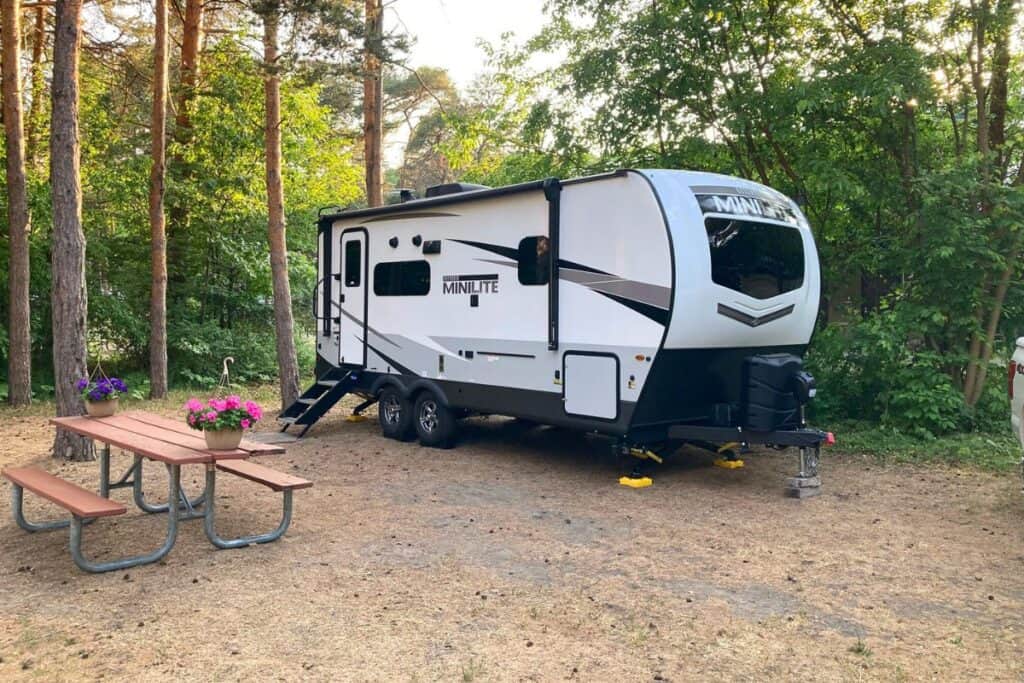
When arriving at a campground, be mindful of your surroundings and fellow campers.
Practicing good campground etiquette and following proper setup procedures can help ensure a pleasant experience for you and everyone around you.
15. Follow Campground Rules: Don’t Be a Rule Breaker
When staying at a campground, make sure to familiarize yourself with and follow the established rules to ensure a harmonious experience for everyone.
Respect quiet hours and noise levels, which are typically posted at the campground entrance or office.
Keep in mind that sound can travel easily in outdoor settings, so be mindful of your volume, especially during early morning or late evening hours.
If you’re traveling with pets, adhere to the campground’s pet policies, which may include leash requirements, designated pet areas, and waste disposal guidelines.
Lastly, avoid cutting through other campsites as a shortcut, as this can be seen as disrespectful and an invasion of privacy.
16. Practice Good Neighbor Habits: Campground Manners
Practicing good neighbor habits goes a long way in creating a positive campground atmosphere.
Keep your campsite tidy and clean by properly disposing of trash, storing food and supplies, and keeping your area free of clutter.
Be friendly and respectful to fellow campers.
If you notice a neighbor in need of assistance, such as helping with setting up equipment or providing a tool they may have forgotten, it’s always nice to offer your help.
However, it’s also important to always respect others’ privacy and personal space, as some campers may prefer a more solitary experience.
Being a good camp neighbor basically boils down to the golden rule, which is “Do to others what you would have them do to you”.
17. Master RV Parking & Leveling: Park Like a Pro
Mastering the art of RV parking and leveling isn’t as hard as you think if you’re an RV beginner.
Before arriving at your campsite, learn how to back your RV into a site safely.
Practice in an open area, using your mirrors and a spotter if necessary, until you feel confident in your ability to maneuver your RV in tight spaces.
Once parked, use leveling blocks and or jacks to ensure your RV is stable and level.
A level RV not only provides a more comfortable living space but also helps your refrigerator and other appliances function properly.
Don’t forget to chock your wheels to prevent your RV from rolling, particularly if you’re parked on an incline.
18. Set Up Utilities Properly: Utility Check
Setting up your RV’s utilities properly is important for both your comfort and the safety of your equipment.
When connecting to electrical, water, and sewer hookups, follow the proper procedures outlined in your RV’s manual or the campground’s guidelines.
For electrical connections, use an RV surge protector appropriate for your camper’s amperage to safeguard from power fluctuations.
When connecting your water hose, ensure it is clean and free of leaks to prevent water waste and potential damage to your RV or the campground’s facilities.
It’s also not a bad idea to use an inline RV water filter and a pressure regulator.
If your RV has a sewer connection, use a high-quality sewer hose like this one from Camco and secure it properly to prevent leaks or spills.
Maintain clean and leak-free hoses by storing them in a designated compartment and replacing them when necessary.
19. Campfires & Firewood: Campfire Fundamentals
Gathering around a campfire is a quintessential part of the camping experience, but it’s important to follow proper campfire etiquette and safety guidelines.
Before starting a fire, check the campground’s rules and local fire regulations to ensure that campfires are permitted.
Always use designated fire pits or rings.
When collecting firewood, follow the campground’s guidelines, as some may require you to purchase firewood on-site to prevent the spread of invasive species.
If allowed to gather your own wood, collect only fallen, dead branches, and never cut live trees or branches.
Keep your fire small and manageable, and always have a bucket of water or sand nearby to extinguish the flames if necessary.
Before retiring for the night or leaving your campsite, ensure that your fire is completely extinguished, dousing it with water and stirring the ashes until they are cool to the touch.
RV Living & Organizational RV Travel Tips
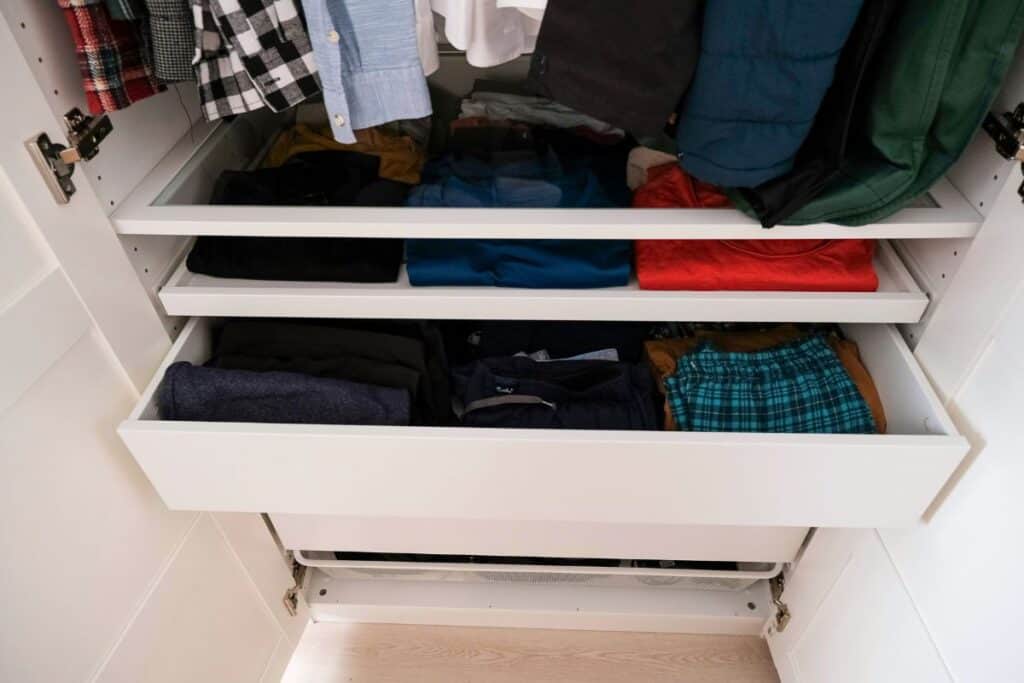
Living in an RV can be a fun and adventurous experience, but it also comes with its own set of challenges, particularly when it comes to space limitations and organization.
To make the most of your RV living, it’s important to develop practical strategies for maximizing storage space, simplifying daily tasks, and maintaining a clutter-free environment.
In this section, we’ll explore a range of RV travel tips for RV living and organizations designed to help you create a functional and comfortable home on wheels.
20. Maximize Storage Space: Unlock Hidden Storage
Maximizing storage space is crucial when traveling in an RV, as every square inch counts.
To make the most of your limited space, utilize vertical storage solutions like shelves and organizers.
Install hooks, pegboards, or magnetic strips to keep items like cooking utensils, tools, and toiletries easily accessible and off countertops.
Add multi-functional furniture with built-in storage, like storage ottomans for added storage.
It’s also helpful to store smaller items in labeled bins or containers, as this helps to keep you organized.
For even more RV storage ideas, check out our blog post “47 RV Storage Ideas to Maximize Your Space for Compact Living“.
21. Simplify Meals & Cooking: Easy Eats
Simplifying your meals and cooking routine can make RV living more enjoyable and less stressful.
Plan your meals ahead of time and prep ingredients before your trip to save time and reduce food waste.
Use versatile appliances like slow cookers and instant pots, which allow you to create delicious, one-pot meals with minimal effort and cleanup.
These appliances are also great for conserving energy and minimizing heat generation inside your RV.
Stock your pantry with non-perishable staples and emergency food, such as canned goods, dried pasta, and trail mix.
This ensures that you always have a meal on hand, even if you’re unable to visit a grocery store or don’t feel like making a big meal.
22. Conservation & Managing Waste: Waste Not, Want Not
Managing waste and practicing conservation is always important but it’s even more important when traveling in an RV.
When it comes to your RV’s waste tanks, use biodegradable, RV-safe treatment drops or chemicals to break down waste and prevent odors.
Regularly monitor your tank levels and dispose of waste at designated dump stations, following proper procedures to avoid spills or contamination.
Implement water-saving techniques when washing dishes or showering, such as using a basin to collect water while washing and taking shorter showers.
You might even want to try a military shower for ultimate shower water conservation, where you quickly wet your body, turn off the water while you soap up, and then rinse off quickly.
As this shower method drastically reduces water usage, making it ideal for RV travel where resources can be limited or when you’re boondocking (more on this later).
You can also install low-flow showerheads and faucet aerators to further reduce water consumption.
23. Staying Connected & Entertained: Stay Plugged In
One of the main benefits of RV travel and getting back to nature is unplugging, however, it’s still important to stay connected.
To help with this it’s a good idea to invest in a reliable Wi-Fi booster designed for RVs like this popular weboost option on Amazon or a mobile hotspot, as this will help to maintain access to the internet for communication and entertainment.
However, because of the remote nature of RV travel and camping, unless you plan on investing in satellite internet like Starlink, there will be times when you can’t find a signal.
Because of this, before embarking on your RV travels, its a good idea to download offline maps, guides, and entertainment, such as movies, TV shows, or e-books, to enjoy during times when internet access may be limited or unavailable.
Don’t forget though that the whole point of RVing is exploration and getting out of your daily routines, which probably involves a lot of tech and screen time.
So take advantage of your surroundings by exploring local attractions, hikes, and events.
Boondocking & Off-Grid RV Travel Tips
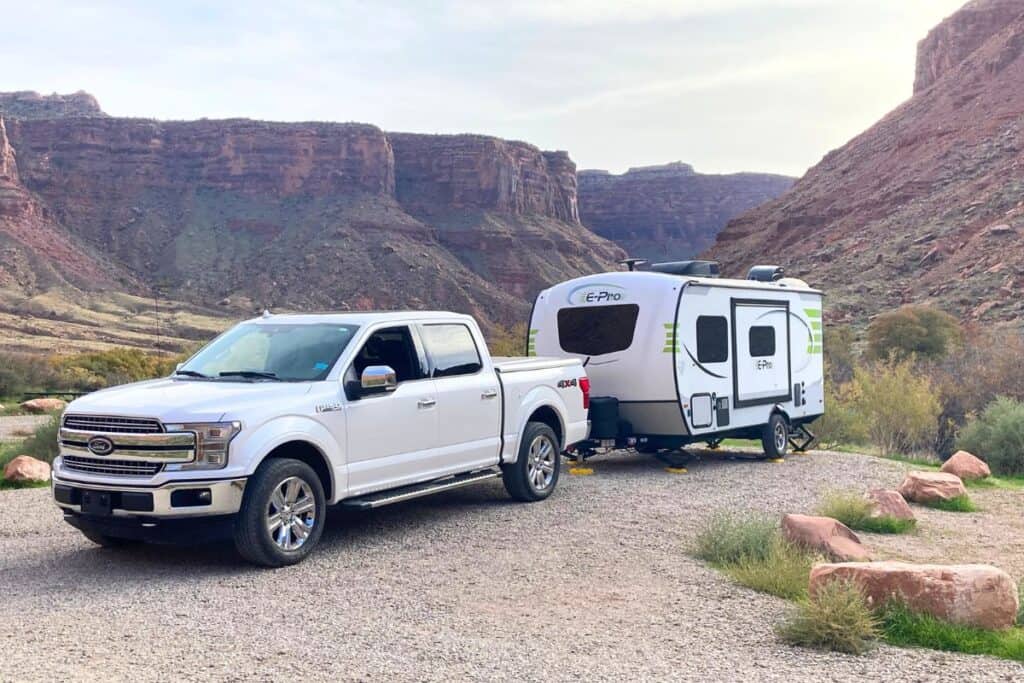
Boondocking, or camping off-grid without hookups, is an increasingly popular way to experience the freedom and solitude of RV camping.
However, while boondocking offers the opportunity to explore remote locations and immerse yourself in nature, it also requires careful planning and preparation to ensure a safe and enjoyable experience.
In this section, we’ll delve into essential boondocking and off-grid RV travel tips to help you make the most of your adventures.
24. How to Find Boondocking Spots: Off-grid Roaming
Boondocking can be a great way to enjoy RVing as well as save some money by avoiding expensive campsites.
However, there are many factors you need to consider when boondocking and one of the most important and sometimes challenging (especially on the East Coast) is finding a place to boondock.
This is where apps and websites come in like Campendium, FreeCampsites.net, or iOverlander, which are resources dedicated to locating free or low-cost off-grid campsites.
These resources often include user reviews, photos, and detailed information about each site.
Beyond these apps and websites though, public lands, national forests, and Bureau of Land Management (BLM) land are always good places to check, as these areas often allow boondocking for a specified number of days.
It’s important to verify stay limits and restrictions before setting up camp though, respect posted private property signs, and obtain any necessary permits or permissions before camping on public lands if required.
25. Conserve Power & Water: Sustain Your Stay
One of the most important practices when boondocking is conserving power and water, as most boondocking sites lack RV hookups.
This means you’ll be relying solely on your RV’s self-contained resources.
The good news though is that there are many things you can do to conserve resources to extend your stay.
Best Ways to Conserve Power While RV Camping & Boondocking:
- Install or add additional roof-mounted solar panels.
- Invest in portable solar panels for more flexible power options.
- Upgrade your RV house batteries from lead acid to AGM or lithium.
- Invest in portable power banks to provide additional auxiliary power.
- Invest in a portable 30-amp or 50-amp RV generator.
- Convert old incandescent RV lighting to modern LED lighting.
- Use a battery monitor to keep track of your electricity usage and battery levels to promote more mindful usage.
- Unplug phantom loads by unplugging devices like TVs, microwave ovens, and chargers that continue to draw power even when turned off.
- Limit inverter use and turn off when not needed, as inverters which convert DC battery power to AC for household devices are inefficient and draw more power.
- Whenever possible, cook outside using a portable gas stove or grill to keep the interior cooler reducing the need for air conditioning.
- Instead of relying on air conditioning, use windows and vents to create a cross-breeze during cooler parts of the day to maintain comfortable temperatures.
- Since water pumps use electricity, conserve water to minimize pump use.
Best Ways to Conserve Water While RV Camping & Boondocking:
- Implement water-saving techniques like using a basin to wash dishes, taking military showers, and turning off the tap while brushing your teeth.
- Instead of running water, use a spray bottle to rinse dishes.
- Place a container in the shower to catch water as it warms up.
- Install a water miser on your RV to automatically recycle the water while you’re waiting for warm water.
- Install low-flow faucets and shower heads.
- Use paper plates to reduce the need for dishwashing.
- Buy one-gallon jugs of drinking water when stocking up on groceries to add additional water supply to your camper.
- Set up a system to capture and purify rainwater for non-potable uses like watering plants, washing outdoor gear, or flushing toilets.
- Consider eating more plant-based meals, which generally require less refrigeration and water for cooking compared to meat-based dishes.
- Make sure everyone in the RV including children understands the importance of water conservation and practices these water-saving tips.
26. Practice “Leave No Trace” Principles: Leave it Better than You Found it
Whether RVing, camping, or just taking a stroll through nature, it’s all our responsibility to maintain the beauty and integrity of these natural areas, not only for our enjoyment but for the enjoyment of future generations.
So make sure to pack out all trash and dispose of it properly, either in designated receptacles or by taking it with you when you leave.
It’s also important to use existing campsites and fire rings whenever possible to minimize your impact on the environment.
If you must build a campfire, keep it small and contained within an existing fire ring, and ensure it’s completely extinguished before leaving.
It’s also important to respect fire bans and follow local regulations to prevent wildfires.
27. Prepare for Emergencies: Ready for Anything
Preparing for emergencies is crucial when boondocking, as you will more than likely be far from immediate assistance.
Because of this, you should have a well-stocked first-aid kit like this one on Amazon, as well as prescription medications, and any items specific to your family’s needs.
You should also pack emergency supplies like extra food, water, and warm clothing in case of unexpected situations or extended stays.
It’s also a good idea to have backup communication devices, such as a satellite phone or two-way radio, to stay connected in areas with limited cell service.
Finally, always make a friend or family member outside of your camping party aware of your general location and direction of travel, in case search and rescue need to locate you in an emergency situation.
28. Utilize Reflective Window Covers: Reflect & Conserve
Utilizing reflective window covers can help regulate the temperature inside your RV while boondocking.
These covers reflect sunlight and heat, keeping your RV cooler during hot days and reducing the need for air conditioning.
In colder weather, reflective window covers can also help insulate your RV, retaining heat and minimizing the need for heating.
Choose covers that are specifically designed for RV windows and are easy to install and remove as needed.
29. Pre-cool Your Food & Refrigerator: Start Cool, Stay Cool
Pre-cooling your food and refrigerator before embarking on a boondocking trip can help conserve power and ensure your food stays fresh longer.
Turn your refrigerator to its coldest setting and allow it to run for several hours or overnight while still connected to shore power.
This will help your refrigerator maintain its temperature more efficiently once you switch to off-grid power sources like 12V, propane, or a generator.
In addition, try to minimize the number of times you open your refrigerator door while boondocking to prevent cold air from escaping.
30. Pack Extra Water Containers: Water Wise
Packing extra water containers is a great way to extend your boondocking stays and ensure that you have a sufficient supply of fresh water.
In addition to your RV’s built-in water tank, bring along several portable water containers like jerry cans that you can fill up before heading to your boondocking site.
These containers can be used for drinking water, cooking, and hygiene purposes, and can also serve as a backup supply in case of emergencies or unexpected situations.
Tips for RV Traveling with Kids
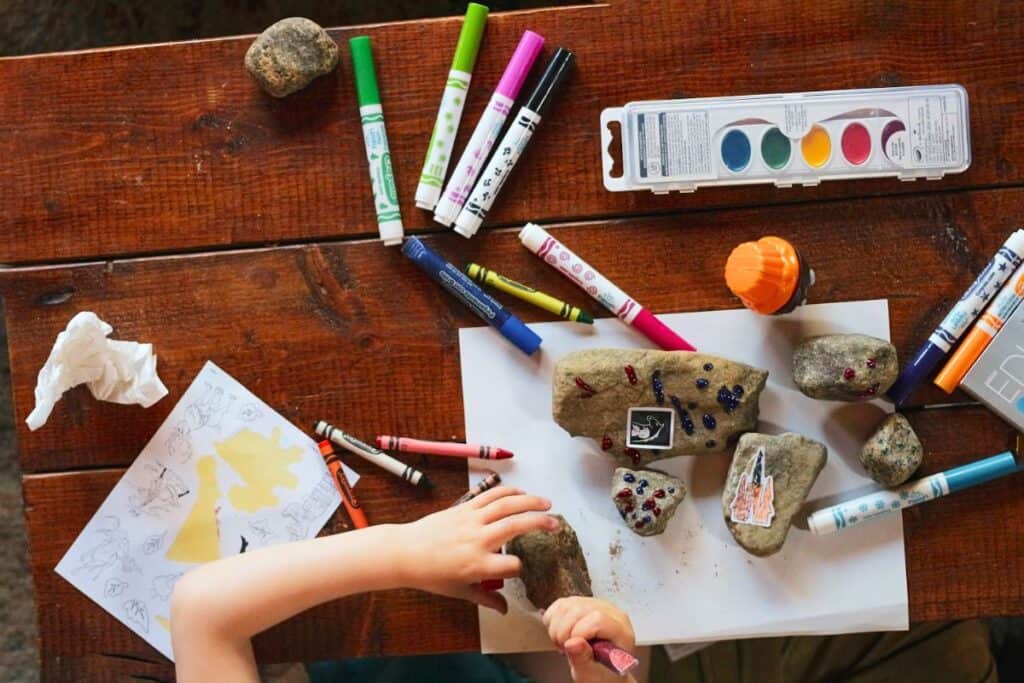
Traveling with kids in an RV can be a great way to create lasting family memories and introduce your children to the joys of outdoor adventure and travel.
However, it also comes with its own set of challenges, from keeping kids entertained during long drives to ensuring their safety and comfort in new environments.
In this section, we’ll explore a range of RV travel tips specifically tailored to families with children.
31. Create a Kid-friendly Space: Kiddie Corner
Creating a kid-friendly space in your RV can help children feel more comfortable and engaged during your travels.
Designate a specific area for play, such as a dinette or a corner of the RV, and equip it with age-appropriate toys, games, and books.
This will give your kids a sense of ownership and provide them with a familiar space to retreat to when needed.
For sleeping areas, use bed rails or safety harnesses to prevent falls and ensure a secure sleeping environment.
Provide each child with their own storage space, such as a dedicated drawer or cubby, to help them stay organized and maintain a sense of personal space within the RV.
32. Plan Kid-friendly Activities: Fun for the Little Ones
Planning kid-friendly activities is key to keeping your children entertained and engaged during your RV adventures.
Research campgrounds and destinations that offer amenities like playgrounds, pools, or kid-friendly attractions.
This will give your children opportunities to burn off energy and socialize with other kids.
Best Ways to Entertain Kids While RV Traveling:
- Hold a mini-scavenger hunt around the campsite using natural items like leaves and rocks.
- Create a travel journal where they can write and draw about their experiences each day.
- Organize a photo challenge with a list of items or scenes they have to capture on camera.
- Bring along board games and card games for evening entertainment.
- Set up a portable projector for outdoor movie nights under the stars.
- Teach them to use binoculars for bird watching or stargazing.
- Have a craft kit ready for making friendship bracelets or simple art projects.
- Download audiobooks or podcasts suitable for children to listen to during long drives.
- Play classic car games like “I Spy” or “20 Questions.”
- Use educational apps on tablets that can teach them about the geography or history of your travel locations.
- Organize nature walks to explore and learn about the local environment.
- Plan simple cooking activities where they can help make meals or snacks.
- Provide them with a map and compass for a basic lesson in navigation.
- Create a “treasure box” filled with small toys or treats they can earn through good behavior or completing educational tasks.
- Play educational games that involve the places you’re visiting, like state capitals or landmark trivia.
- Engage them in planning the itinerary by letting them pick activities or stops for the day.
- Have them help with navigating by reading road signs and tracking progress on a map.
- Bring a small, portable pool for quick and easy fun at the campsite.
33. Maintain a Routine: Rhythm of Life
Just like adults, kids crave routine.
Maintaining a routine while traveling in an RV can help provide a sense of stability and normalcy for your kids.
Stick to regular meals and bedtimes as much as possible, even if your daily activities vary. This will help regulate your children’s energy levels and ensure they get enough rest.
Schedule daily quiet time or naps to give everyone a chance to recharge and relax.
Plan educational activities or road-schooling lessons to keep your kids learning and engaged during travel days.
34. Involve Kids in RV Life: Campers in Training
Involving your kids in RV life can help them feel more connected and invested in your travels.
Assign age-appropriate chores, such as sweeping the floor or organizing their personal belongings, to give them a sense of responsibility and ownership.
Teach them about RV maintenance and safety, such as checking tire pressure or properly disposing of waste, to help them understand the importance of taking care of your home on wheels.
Encourage your kids to help plan trips and activities, giving them a voice in the decision-making process and fostering a sense of excitement and anticipation.
35. Pack Essential Kid Gear: Child’s Play
Packing essential kid gear is a way to ensure your children’s comfort and well-being during your RV travels.
Bring favorite comfort items, such as blankets or stuffed animals, to help your kids feel secure and at home in new environments.
Stock up on healthy snacks and drinks to keep your children nourished and hydrated during long drives or outdoor activities.
Have a well-stocked first-aid kit with kid-friendly medications, such as pain relievers and antihistamines, to address any minor health issues that may arise.
36. Prioritize Safety: Safe & Sound
While safety is always important when RV traveling, when there are kids on board it becomes even more important.
Teach your children essential RV safety rules and emergency procedures, such as how to exit the RV quickly in case of fire and how to call for help.
Use appropriate car seats or restraints for younger children while driving to ensure their safety on the road.
Monitor your kids closely during campfire and outdoor activities, ensuring they understand the importance of staying a safe distance from flames and respecting wildlife.
Recent Posts
Are you ready to transform your pop-up camper into a cozy and stylish home away from home? Pop-ups offer a great blend of affordability, flexibility, and convenience. However, older models often...
Picture this: you're parked at a scenic campsite, the great outdoors stretching out before you. You step outside your RV, ready to soak in the fresh air and beautiful views. But wait - something's...
